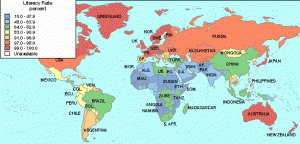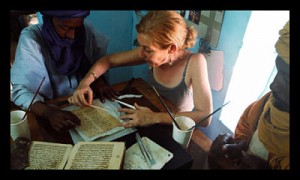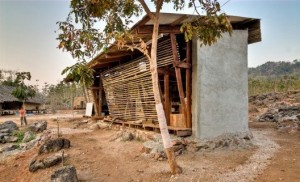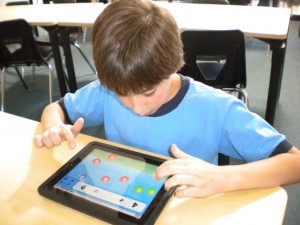Several years back, I partnered with the local Rotary Club to help start a library in a Nigerian school. I sent out a newsletter to our school community, asking for quality new and used book donations. I also weeded out my library and gave books that were in good condition but no longer used by my students. I had strict guidelines about the type of books included in the donation boxes: no grossly outdated books, no books with violence or war, no ripped or torn books, and no books with culturally confusing content. The students at my school were so excited about the project, they loved the thought of giving their books to help others. Of course, over the years, perceptions have changed about building libraries in developing nations. Do they really want our discards? Do they need actual paper books? Why not just give them each a mobile device and not bother with a brick and mortar structure?
In Deena Dulgerian’s blog post for the Borgen Project, she notes that while American libraries have lost much of their appeal, their usage is only just beginning in developing countries. Libraries are a vital meeting place and safe haven for many in developing countries. A place to check out books, use the computer, meet socially, and receive much needed resources and services. I believe that mobile devices have a place in these libraries. The Bill & Melinda Gates Foundation is one of the leaders in worldwide literacy, and is currently piloting a program in Kenya, using devices in public and community libraries preloaded with relevant information. But for 60% of the world without access to the internet, quality books, caring staff and a safe place to meet and read is a good start.
As a teacher-librarian, continuing to build my collection of e-books, giving students access to the collection from home with Destiny Quest OPAC, and leading the charge for improved technology, upgrades and access in my school, are just some of the ways that I can help students. Many of the mobile devices that they bring to school are of such poor quality, however, that it is difficult to access the information. I think uniformity and quality of devices would lead to smoother lesson plans and increased learning outcomes. The Los Angeles Unified School District is giving 640,000 students ipads this year in an effort to prepare students for life after graduation, where every job will require some level of technological skill. It is quite obvious that we need to copy this initiative in our district!





Some interesting discussion and exploration around this inquiry topic. Your work towards helping libraries in the past was probably very well recieved, but with new directions and new understandings, helping developing nations create their own cultural libraries that provide resources and information in their own languages, and about their own cultures is ultimately preferable. Building up literacy, community and access are very important developments for these countries to raise their quality of life. One aspect to discuss is how much cheaper and easier it is to roll out mobile internet through cell phones, then it is to run wires and cables across countries and continents, One aspect of the Los Angeles Ipad rollout you may want to follow up on is how it was bungled and has been stopped, you may want to look else where for implementation advice (https://www.google.ca/webhp?sourceid=chrome-instant&ion=1&espv=2&ie=UTF-8#q=la%20ipad%20scandal ).
Finally, we should still keep trying to get your “tags” working!
I appreciated reading your inquiry blog post. It is interesting to note your firsthand experience in the past of helping developing nations with literacy and changes in attitude and application over time. Your discussion of the need of brick and mortar buildings as ‘IRL’ social hubs in these countries is important. I agree with your comments regarding having infrastructure in place in both developed and developing nations to best facilitate mobile library usage. – Best
I enjoyed reading about your initiative to help a Nigerian school in the past. It is making me ask myself, ‘what can I do to contribute as a global citizen who values literacy and equity?’ I am thinking that brick and mortar buildings, though a wonderful meeting place, may be taking up money and resources to provide digital devices that provide internet access to all; therefore information to all. I wonder how both 21st century technologies and the sense of traditional communities can be nurtured in developing countries?